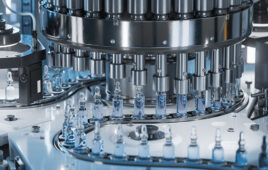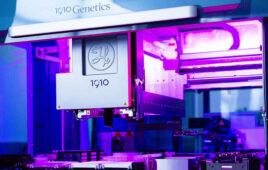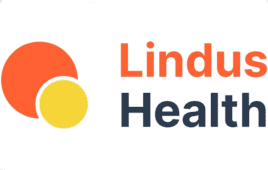
Rice Biotech Launch Pad: A collaboration hub at TMC’s Helix Park. [Image courtesy of TMC Helix Park | Texas Medical Center]
Houston, the nation’s fourth largest city, has not traditionally been a leader in biotechnology, but Rice University’s new Rice Biotech Launch Pad aims to change that. As Omid Veiseh, director of the Launch Pad, explains, “What we wanted with the Launch Pad was something different.” The goal is to capitalize on Rice’s research strengths and the vast medical expertise at the nearby Texas Medical Center.
Houston’s blank canvas for biotech innovation
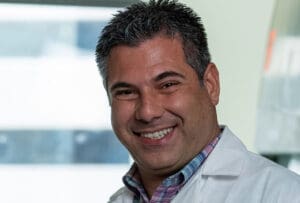
Omid Veiseh, Ph.D.
Veiseh, who was the co-founder of Avenge Bio and Sigilon (acquired by Eli Lilly in 2023), emphasized Houston’s potential for innovation in healthcare. “The thing that attracted me to Houston was the opportunity to innovate healthcare for unmet patient needs,” said Veiseh, who is now an associate professor of bioengineering at Rice. Upon moving to Houston from the Boston area, Veiseh recalls being puzzled why there wasn’t more of a biotech entrepreneurship ecosystem in Houston, so he decided to do something about it.
“The opportunity in Houston is to build an ecosystem from scratch and organize it properly, like a blank canvas,” said Veiseh. “I believe this could create something even more unique than what exists in places like Kendall Square in Boston that grew organically over time.”
Bringing Rice’s bioengineering from bench to bedside
As Paul Wotton, Ph.D., executive director of the Launch Pad, said when pitching to investors: “help us design this from the get-go” as partners in this new biotech infrastructure.
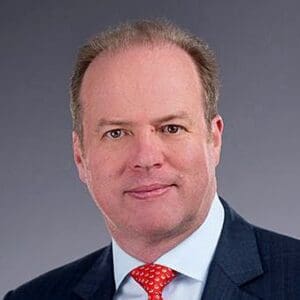
Paul Wotton, Ph.D.
“The key thing is that there is a market-led approach to the work we’re doing, as well as to some of the problems we’re solving,” Paul Wotton, executive director of the Launch Pad, stated. The Launch Pad begins with physicians’ observations of needs in their practice at departments like bioengineering. “That’s our starting point. We aim to find that application and work backwards, ensuring that if there’s a concept within the Rice University bioengineering group, we can take that concept to the clinic within five years. That’s the ultimate challenge,” explained Wotton, who is a seasoned CEO, board member, and entrepreneur, including the co-founder of Avenge Bio.
Rice University has demonstrated growing expertise in developing new drug candidates. For example, cytokine-releasing implant AVB-001 from Rice spinout Avenge Bio showed ability to eradicate ovarian tumors in mice and started first-in-human testing in 2022 at MD Anderson Cancer Center.
Rice Biotech Launch Pad has big long-term ambitions
“Rice has a highly qualified faculty in the engineering department and the bioengineering group, similar to groups like MIT,” Wotton said. “There’s a lot of opportunity at Rice to take these technologies, practice them, and put them into the clinic early, creating value through spin-out companies, partnerships with pharmaceutical companies, and attracting brand-name investors to participate in the growth of Houston’s biotech industry.”
Wotton is optimistic about the future impact of Rice University’s Launch Pad. “I expect that in 30 years’ time, people will look back and say, ‘You know, when those guys started, you could never believe that we’d create something akin to what you see in Kendall Square in Cambridge,’” Wotton said.
An intentional biotech hub
Another thing that makes the Launch Pad “unique,” says Veiseh, is having everything consolidated on one campus, unlike more “fragmented” hubs like the San Francisco Bay Area. Veiseh believes Houston’s “blank canvas” allows for an even more intentional layout than clusters that grew organically over decades, like Kendall Square in Boston. With financial backing from federal and philanthropic sources, the Launch Pad will provide space and facilities to nurture new startups. Wotton highlights that “companies get rent-free use of those labs for the first couple of years.”
The Rice Biotech Launch Pad has financial support from a combination of federal grants and philanthropic donations. The accelerator platform will provide roughly 15,000 square feet of dedicated accelerator space for research, collaboration, and development activities central to the program’s mission. The space is set to be ready this summer. “The companies coming out of the Launch Pad get the benefit of moving into the Texas Medical Center, on the Helix Park campus,” Wotton said. “The companies get rent-free use of those labs for the first couple of years, which is a significant benefit.” Helix Park spans 37 acres and is planned to have 5.4 million square feet of development.
A growing roster of biotech luminaries
The external advisory board for the Rice Biotech Launch Pad includes the following individuals:
- Jason Bock, Ph.D., founder and CEO of CTMC.
- Albert Cha, M.D., Ph.D., managing partner at Frazier Life Sciences.
- Rima Chakrabarti, M.D., partner at KdT Ventures.
- John Flavin, MBA, founder and CEO of Portal Innovations.
- Pierre Jacquet, M.D., Ph.D., managing director at L.E.K. Consulting.
- Robert Langer, Sc.D., MIT professor and Langer Lab leader.
- Dennis Lee, Ph.D., senior program officer at the Gates Foundation.
- Ferran Prat, Ph.D., J.D., SVP of Industry Relations at MD Anderson.
- Josh Richardson, M.D., managing director at Goldman Sachs.
- David Schull, J.D., President of Russo Partners, a public and investor relations firm working with innovators in health and technology.
- Lisa Wright, MBA, President and CEO of Community Health Choice, a Houston-based, nonprofit, managed care organization.
- Kevin Sheridan, MBA, Managing Director and Joint Global Head of Healthcare Investment Banking at Jefferies.
- Bob Ruffolo, Ph.D. in Pharmacology, Chairman of Aragen Biosciences, Managing Director of Ruffolo Consulting, LLC, and former President of Research and Development at Wyeth Pharmaceuticals (now Pfizer).
Referring to the roster of names, Wotton said that it hasn’t proved challenging to find “terrific” advisory board members. “Some of the calls were literally just getting the elevator speech out and in the first 30 seconds to a minute, and hearing, ‘Just sign me up,’” he said.
Launch Pad courts anchor tenants
The Rice Biotech Launch Pad is actively pursuing grants, partnerships, philanthropic support, and guidance from its advisory board in order to fund the rapid translation of promising health research from Rice University into clinical applications. To date, the Launch Pad has received a $45 million Advanced Research Projects Agency for Health (ARPA-H) award as well as philanthropic gifts and donations.
Wotton notes that the Launch Pad plans to seed between eight and twelve startups per year. The platform also is working on attracting major venture capital (VC) groups to Houston, emphasizing the need for “anchor tenants” in the area, as Wotton put it. More capital obviously opens up new opportunities. “What we want to do is bring in really big VC groups to work with us alongside the faculty at Rice,” he said.
Filed Under: Biologics, Cell & gene therapy, Oncology
